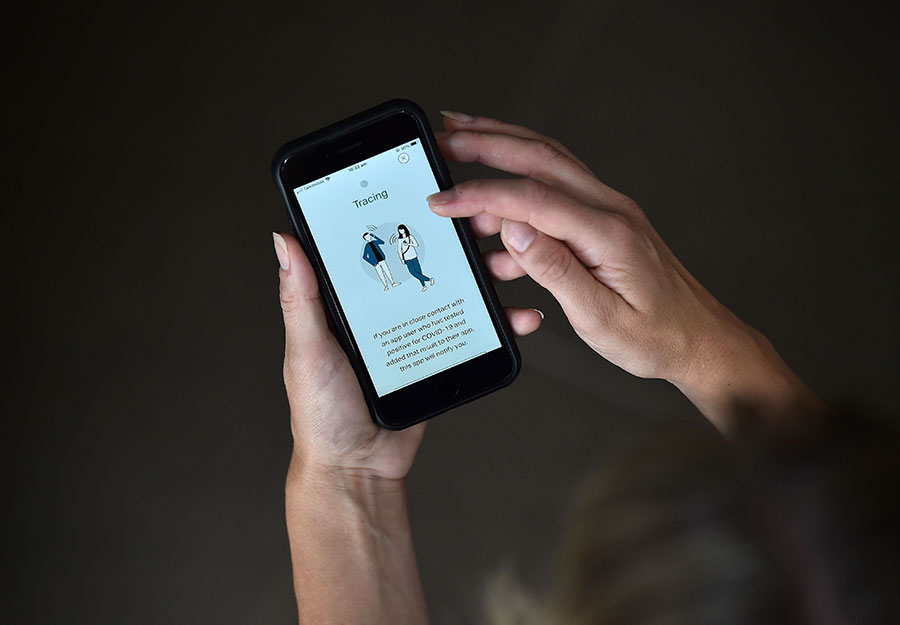COVID Alert App Is Now Available But New Poll Suggests Canadians Are Unwilling to Download

Canadians will now be able to download the COVID Alert exposure app, a tool that will alert them if they come into contact with COVID-19. Photo: Charles McQuillan/Getty Images
Prime Minister Justin Trudeau today announced that the COVID-19 exposure notification app is now available for download.
And while the new app is being touted as an important tool in helping stop the spread of the disease, a recent poll suggests the majority of Canadians are worried about privacy issues that come with the technology.
“I downloaded the app this morning, and I encourage you to do the same,” said Trudeau, speaking today at the Public Health Agency of Canada press conference aimed at promoting the digital tool to Canadians.
“The more people who use it, the better it can trace and slow the spread of the virus,” he added.
The COVID Alert app was originally developed by volunteers from Shopify, a Canadian e-commerce company. Shopify made the code available to the public for free and it was customized for Canadians by a collaborative team of developers from Apple, Google and BlackBerry.
The COVID Alert tool is a smartphone app that is available for both Apple as and Android devices.
How it Works
Here’s how it works. Person A tests positive for COVID-19. He or she will be asked to upload this result onto the app, using a random security code generated by the health-care provider who conducted the test. (These codes will be deleted after 15 days.)
If Person B, who also uses COVID Alert, comes in close contact (two meters) with Person A, he or she will get an encrypted notification sent via Bluetooth warning them that they’ve come in contact with a person who has the disease.
The alert will pop up, with the message: “You have been exposed to COVID-19.” The app will suggest that they contact their public health authority for a test.
It’s all meant to cut down the risk of the dreaded second wave of COVID-19, especially as economies open up and people begin returning to work. Public Health authorities hope the app will allow them to quickly identify new cases and, either minimize exposure or treat the patient in a timely manner.
While some people fear that the app could be a privacy risk, this government video assures users that COVID Alert “won’t collect any personally identifiable information,” such as your name, address or location.
The prime minister emphasized this point today. “This app isn’t mandatory. It’s completely voluntary to download and to use,” Trudeau said. “And it doesn’t collect your name, address, geolocation, or other personal information.”
Privacy Concerns
A recent poll, however, suggests Canadians are leery of the exposure technology.
Conducted in mid-July by the INNOVATIVE Research Group, the poll suggests that only 29 per cent of respondents said that they would be “definitely/very likely” to download the app. Compare this with the 31 per cent who said the “would definitely not or were very unlikely” to have the app on their phone.
And while you might expect younger people would be comfortable with anything techie, this isn’t the case. Only 34 per cent of Canadians surveyed between the ages of 18 and 34 said they were “very or somewhat likely” to use the app. For the over 55 group, that figure drops to 27%.
It seems privacy is the main concern with this technology. The poll found that 41 per cent of respondents said they were “concerned there won’t be enough privacy protection.”
The only way exposure apps like COVID Alert work is if huge numbers of users download them. However, based on this poll, it seems the majority of Canadians will be slow in adopting this technology. And this could have a severe impact on the tool’s effectiveness.
RELATED
New Contact Tracing App Promises to Curb Spread of COVID-19; But It’s Raising Privacy Concerns
Trudeau Tells Hearing He Didn’t Intervene in WE Charity Recommendation